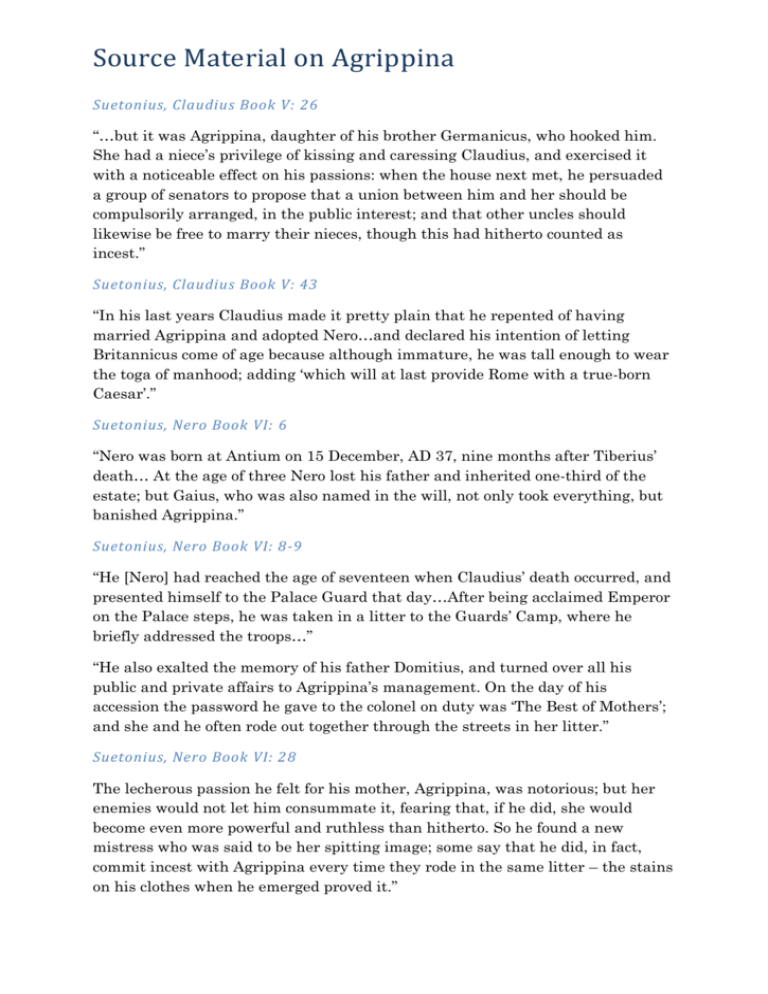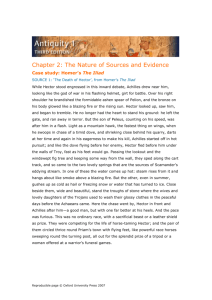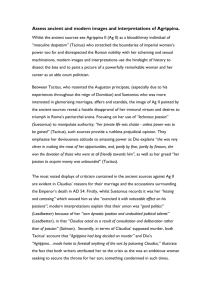but it was Agrippina, daughter of his brother
advertisement

Source Material on Agrippina Suetonius, Claudius Book V: 26 “…but it was Agrippina, daughter of his brother Germanicus, who hooked him. She had a niece’s privilege of kissing and caressing Claudius, and exercised it with a noticeable effect on his passions: when the house next met, he persuaded a group of senators to propose that a union between him and her should be compulsorily arranged, in the public interest; and that other uncles should likewise be free to marry their nieces, though this had hitherto counted as incest.” Suetonius, Claudius Book V: 43 “In his last years Claudius made it pretty plain that he repented of having married Agrippina and adopted Nero…and declared his intention of letting Britannicus come of age because although immature, he was tall enough to wear the toga of manhood; adding ‘which will at last provide Rome with a true-born Caesar’.” Suetonius, Nero Book VI: 6 “Nero was born at Antium on 15 December, AD 37, nine months after Tiberius’ death… At the age of three Nero lost his father and inherited one-third of the estate; but Gaius, who was also named in the will, not only took everything, but banished Agrippina.” Suetonius, Nero Book VI: 8-9 “He [Nero] had reached the age of seventeen when Claudius’ death occurred, and presented himself to the Palace Guard that day…After being acclaimed Emperor on the Palace steps, he was taken in a litter to the Guards’ Camp, where he briefly addressed the troops…” “He also exalted the memory of his father Domitius, and turned over all his public and private affairs to Agrippina’s management. On the day of his accession the password he gave to the colonel on duty was ‘The Best of Mothers’; and she and he often rode out together through the streets in her litter.” Suetonius, Nero Book VI: 28 The lecherous passion he felt for his mother, Agrippina, was notorious; but her enemies would not let him consummate it, fearing that, if he did, she would become even more powerful and ruthless than hitherto. So he found a new mistress who was said to be her spitting image; some say that he did, in fact, commit incest with Agrippina every time they rode in the same litter – the stains on his clothes when he emerged proved it.” Suetonius, Nero Book VI: 34 The over-watchful, over-critical eye that Agrippina kept on whatever Nero said or did proved more than he could stand. He first tried to embarrass her by frequent threats to abdicate and go into retirement in Rhodes. Then, having deprived her of all honours and power, and even of her Roman and German bodyguard, he refused to have her living with him and expelled her from his Palace; after which he did everything possible to annoy her, sending people to pester her with law-suits while she stayed in Rome, and when she took refuge on her riverside estate, making them constantly drive or sail past the windows, disturbing her with jeers and cat-calls. In the end her threats and violent behaviour terrified him into deciding that she must die. He tried to poison her three times, but she had always taken the antidote in advance; so he rigged up a machine in the ceiling of her bedroom which would dislodge the panels and drop them on her while she slept. However, one of the people involved in the plot gave the secret away. Then he had a collapsible boat designed which would either sink or have its cabin fall in on top of her. Under pretence of a reconciliation, he sent the most friendly note inviting her to celebrate the Feast of Minerva with him at Baiae, and on her arrival made one of his captains stage an ostensibly accidental collision with the galley in which she had sailed. Then he protracted the feast until a late hour, and when at last she said: ‘I really must get back to Bauli,’ offered her his collapsible boat instead of the damaged galley. Nero was in a very happy mood as he led Agrippina down to the quay, and even kissed her breasts before she steeped aboard. He sat up all night, on tenterhooks of anxiety, waiting for the outcome of his scheme. On discovering that everything had gone wrong and she had escaped by swimming, when Lucius Agerinus, her freedman, entered joyfully to report that she was safe and sound, Nero, in desperation, ordered one of his men to drop a dagger surreptitiously beside Agerinus, whom he arrested at once on a charge of having been hired to murder the Emperor. After this he arranged for Agrippina to be killed, and made it seem as if she had sent Agerinus to assassinate him but committed suicide on hearing that the plot had miscarried. Other more gruesome details are supplied by reliable authorities: it appears that Nero rushed off to examine Agrippina’s corpse, handling her limbs and, between drinks to satisfy his thirst, discussing their good and bad points. Though encouraged by the congratulations which poured in from the Army, the Senate, and the people, he was never either then or thereafter able to free his conscience from the guilt of this crime. He often admitted that he was hounded by his mother’s ghost and that the Furies were pursuing him with whips and burning torches; and set Persian magicians at work to conjure up the ghost and entreat its forgiveness. During his tour of Greece he came to Athens, where the Eleusinian Mysteries were being held, but dared not participate when a herald ordered all impious and criminal persons present to withdraw before the ceremonies began. Cassius Dio: Roman History Book 59.3.4 -6 Gaius’ Conduct as Emperor (A.D. 37) “His [Gaius’] mother, his sisters and his grandmother Antonia he treated at first with great respect. He immediately gave Antonia the title ‘Augusta’ and appointed her priestess of Augustus, granting her on the spot the full privileges of the Vestal Virgins. To his sisters he also granted these privileges of the Vestal Virgins and in addition the right to watch the games in the circus with him from the same front seats, and the right to have their names included not only in the prayers offered annually by the magistrates and priests for his own welfare and the welfare of the state, but also in the oaths of allegiance that were sworn to his rule…. Yet, after doing all this, he acted in a most impious fashion towards both his grandmother and his sisters. He forced his grandmother to commit suicide because she had criticized him for something; and as for his sisters, after taking them all as sexual partners, he banished two of them to an island; the third had already died. Cassius Dio: Roman History Book 59.22.8 A.D. 39 “As for his sisters, he [Gaius] deported them to the Pontian islands because of their sexual activities with Lepidus, after accusing them in a letter to the senate of many treasonable and licentious acts. Agrippina was given Lepidus’ bones in an urn and told to carry it back to Rome, keeping hold of it in her lap the whole way. And as many honours had previously been voted to his sisters clearly on his own account, he forbade the award of any distinction to any of his relatives.” Cassius Dio: Roman History Book 60.4.1 Claudius’ recall of exiles A.D. 41 “… He (Claudius) also brought back those whom Gaius had unjustly sent into exile, including Gaius’ sisters Agrippina and Julia, and restored their property to them.” Study Questions: Find and list the dates for the following events: EVENT Tiberius’ death Gaius (Caligula)’s accession to Princeps (Emperor) Nero’s birth Agrippina’s banishment by Gaius Agrippina’s return (by order of Claudius) Claudius’ accession to Princeps (Emperor) Agrippina’s marriage to Claudius Claudius’ death Nero’s accession to Princeps (Emperor) Agrippina’s death DATE COMMENT





